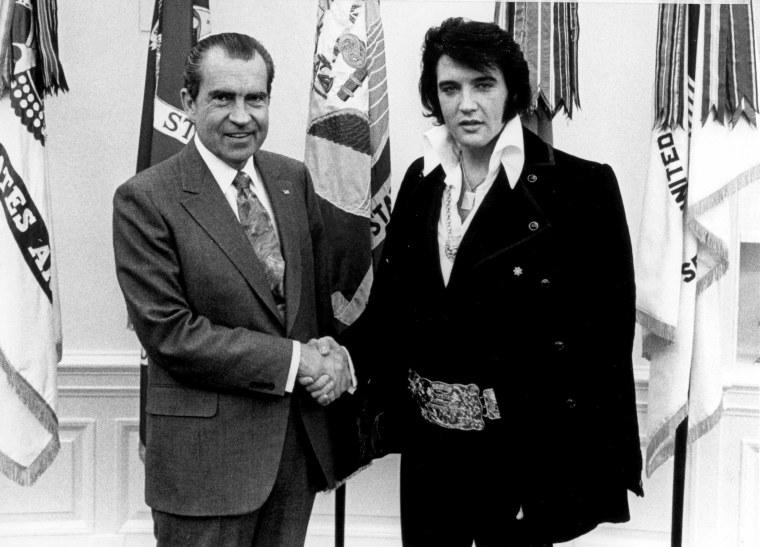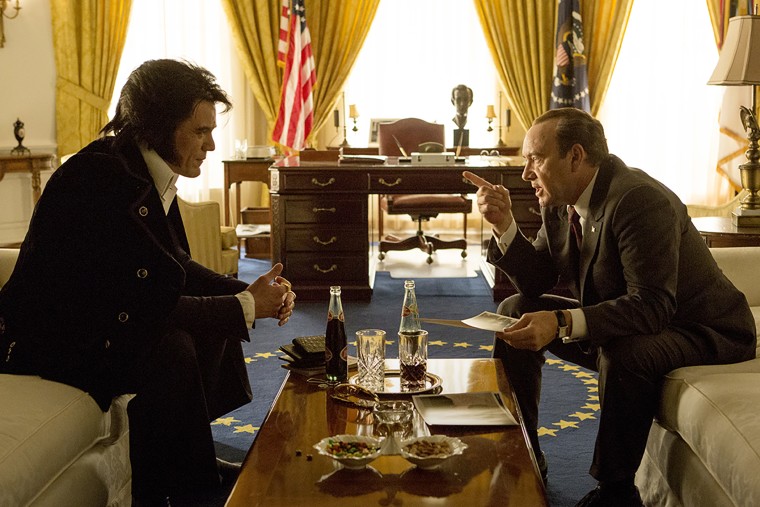There’s a protocol involved in requesting a meeting with the President of the United States — one that for even the highest of dignitaries can take months if not years. But when you’re the King of Rock and Roll and the fence in front of your house is grander than his, you’re not necessarily one for formalities.
“Elvis & Nixon,” in theaters Friday, tells the bizarre story of Elvis Presley’s 1970 meeting with President Richard Nixon, initiated when Presley unexpectedly hand-delivered a letter to the northwest gate of the White House. Presley’s goal was to be named a Federal Agent-at-Large for the Bureau of Narcotics and Dangerous Drugs — and perhaps more important, to take home an official badge to accompany the title.

The film stars Michael Shannon as Elvis Presley and Kevin Spacey as Richard Nixon with the story largely sourced from two books — one by long time Elvis friend Jerry Schilling and the other by Nixon staffer Egil “Bud” Krogh, both of who are portrayed in the movie.
Largely comical in nature, “Elvis & Nixon” explores Presley’s obsession with securing the secret White House meeting, Nixon’s initial reluctance and the hilarity that takes place when two of history’s most fascinating people come together in the Oval Office.
MSNBC spoke with the film’s director, Liza Johnson, ahead of its theatrical release. The conversation has been condensed and lightly edited.
Elvis Presley and President Nixon are two of the most impersonated people of the last century. How difficult was it for Michael Shannon and Kevin Spacey to find the right approach to portraying them?
I think that they’re both really skilled and practiced at creating a character. They are studying the physical work of those historical figures and listening to their voice. But I think that what Kevin and Michael are doing is really trying to think about, where is that character in his life at this moment in 1970? And for Elvis, why does he want to go on this journey in the first place? Similarly with Nixon, where is he in his Presidency? What has he already done in his career and what is still on the horizon? What is probably in the works that he’s keeping secret? And I think that because they’re doing that and because there is a story to play that it allows them to take it in a different direction than when you’re Rich Little on Johnny Carson. And Kevin, by the way, is great at that. I think he’s as good as Rich Little at that.
How many creative liberties did you take in telling this story? For example, did Elvis really give Nixon a karate demonstration in the Oval Office?
I don’t know the answer to that because they really were in there alone, by themselves. What I do know is this: I know that Elvis has given karate demonstrations to other politicians. I know he did one for the Mayor of Memphis. Given that the project acknowledges the kind of absurdism and the comedy of situation of having those two guys in a room together, I think that there’s a meaningful reason for the karate to be there that may or may not be literally true.
Was there one particular element of the story that was so bizarre, you worried it wouldn’t come off as believable?
Well honestly, there are things like that that people think I made up but I didn’t. Like just simply that Elvis just goes up to the northwest gate of the White House and asks to give this letter to Nixon. People think that that didn’t happen. I met a journalist recently who thought that the letter was made up. The things that are the most historically accurate, people are presuming those also to not be true because it’s such a surreal chapter of American history.
How different do you think the White House’s relationship with the entertainment industry was back then versus today? And are the differences a sign of the times or the person in office?
I would say both. I guess as I learn more about Nixon, he might have been more media savvy than I ever thought of him. I always think of him as kind of sweating it out in the Nixon-Kennedy debate and not really understanding television. And that might not really be accurate, but that’s how I always think of him and I think a lot of us think of him as kind of being not savvy about those things.
RELATED: Information wants to be free: Famous leaks through the ages
The overall tone of the film is light and fun, while at the same time, it portrays Elvis as incredibly serious about his mission. Do you think he was delusional?
I don’t think he was delusional. For example, Jerry [Schilling] told me that he actually did go undercover with law enforcement sometimes, like in Memphis ... and had gone undetected. So he knew that he could do that. But I do perfectly well understand why no one would believe that. Because here he is, the most recognizable, most famous face in the history of Earth thinking that he can just go undercover. Delusional is a strong word, but I do think that he is a person that nobody ever said no to. And so he was used to the idea that he could just kind of get a table at a restaurant or get an appointment to see the President. And that seemed delusional, but actually it worked. Some of it is just about how difficult it must be to navigate that level of celebrity.
The film does a great job of conveying the hilarious awkwardness during the meeting — White House protocol thrown out the window. How much of that was a deliberate power play between the King and the president?
Michael Shannon and I were talking about this together the other day in a press conference and I even wonder whether he and I even think about it in the same way. One of the things that happens in that scene is that there’s some competition between them. And that seems to me like one of the ways that these super powerful white guys can relate to each other is by competing. Someone asked [Michael] something about that scene [where Elvis eats Nixon’s M&M’s] and he said, “He just wanted to see what would happen if he did that. Would Nixon tell him to put the M&M’s down?”
Who do you think the meeting had the potential to benefit more, Elvis or Nixon?
I guess it just depends on what it meant to Elvis because he seemed to really want the approval of the President. And also really just literally to want that badge. I think he wanted both of those things. So I think that if you believe in the earnestness of his desire that he really did benefit from the meeting. And I think in a instrumental way, Nixon did stand to benefit from it, but then they kept their word and they didn’t release that picture right away. They didn’t make a big press opportunity out of it. I don’t think he benefited instrumentally the way that his aides asked for or hoped for in the film.
Nixon is presented as a bit of a square who is out of touch with cultural America. Elvis comes across as respectful of the office but naive about the workings of Washington. How much do you think the meeting changed their impressions of one another?
To me, one of the most surprising and satisfying aspects is the end, when [Nixon’s] actually kind of tickled. And he looks at his autograph and he digs the gift that Elvis has given him. I really like that interpretation, that at a certain point he’s just kind of tickled that he met Elvis.
